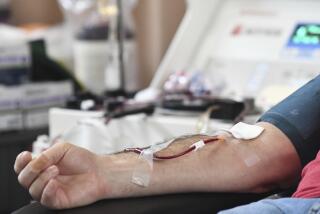AIDS Fears Prompt Decline in Number of Transfusions : Health: More people are choosing to deposit their own blood before surgery, study finds.
- Share via
The widespread concern about blood safety triggered by the AIDS epidemic has caused the number of blood transfusions in the United States to decline since 1986, according to a new Harvard Medical School study.
At the same time, the number of blood donations that individuals make in advance of surgery for their own use increased sharply.
Otherwise-serious blood shortages were forestalled by “the unprecedented decline in transfusions of whole blood and red cells,” the growing popularity of blood predeposits, and the continued importation of blood products from Western Europe, scientists at the Center for Blood Research in Boston, a Harvard affiliate, report in today’s New England Journal of Medicine.
“We see evidence of a major adjustment on the part of physicians, patients, blood donors and the public at large to the AIDS crisis,” said Douglas Surgenor, the principal author of the study. “AIDS has been the primary stimulus in beginning to raise questions about the appropriateness of many transfusions.”
Since 1985, blood has been screened for the human immunodeficiency virus, the cause of AIDS. In May, an improved screening test was introduced for hepatitis C, a liver ailment which is the most common serious infection spread by blood transfusions.
The risk of becoming infected with AIDS through a blood transfusion is currently considered about one per 150,000 units transfused, according to Dr. Jay Menitove of the Blood Center of Southeastern Wisconsin in Milwaukee. By comparison, Menitove estimated that the new hepatitis C test would reduce the risk of contracting that infection from one per 300 units transfused to one per 1,500 units transfused.
The Harvard researchers compiled data on blood donations and transfusions from many sources, including the federal government, national blood bank organizations and their own surveys.
Among their specific findings:
Total collections of blood in the United States increased from 10.9 million units in 1980 to 13.4 million units in 1987. The 1987 totals included 12.1 million units collected at blood centers, 1.3 million units collected at hospitals, 274,000 units imported from Europe, and 397,000 units that were predeposited, mostly by elective surgery patients.
The total amount of blood collected did not change between 1986 and 1988.
Transfusions of whole blood and packed red blood cells, the most common type of transfusion, peaked at 12.2 million units in 1986 and declined to 11.6 million units in 1987. This decline continued in 1988. By comparison, such transfusions were increasing by 4.5% a year in the early 1980s.
Transfusions of blood plasma declined by 10% between 1984 and 1987. Growth in transfusions of platelets also slowed.
Predeposits of blood increased from fewer than 20,000 units in 1982 to 397,000 units in 1987, or about 3% of total blood collections.
A related report in the New England Journal, by physicians at Children’s Hospital in Oakland, calls attention to medical problems some black sickle-cell anemia patients experience when they receive blood transfusions from white blood donors.
The problem, known as alloimmunization, occurs when a transfusion recipient becomes sensitized to proteins contained in donors’ blood. This makes it more difficult to find compatible blood for subsequent transfusions and may increase the likelihood that recipients will suffer transfusion reactions, such as fevers, pain and jaundice.
Sickle-cell anemia patients have abnormal blood cells that can clump together and clog blood vessels. The disease occurs primarily in blacks. Patients may have severe medical problems, such as pain, infections and low blood counts. They frequently require blood transfusions.
The Oakland study found that 30% of the 107 sickle-cell anemia patients studied became sensitized to blood proteins through transfusions and 11% of these patients had delayed transfusion reactions. The proteins primarily responsible were those whose frequency differs between blacks and whites.
The study recommended that “black persons be aggressively recruited as blood donors,” both to increase the national blood supply and the availability of matched blood for patients with sickle-cell anemia.
In addition, an editorial by Dr. Samuel Charache of Johns Hopkins University School of Medicine in Baltimore said that the “merits” of asking blood donors to indicate their race--which is not done now--should be debated. Charache said such information would help blood banks locate “compatible donors,” but the social cost could be high.
“This suggestion may bring to mind the days of ‘colored only’ drinking fountains and segregated buses, but perhaps reason would prevail instead of emotion if careful explanations were offered,” Charache wrote.






